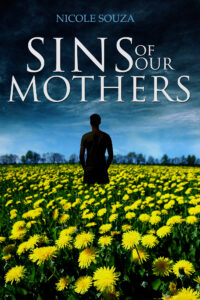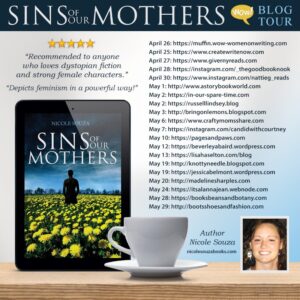 Novelist Nicole Souza is here today to chat about her new dystopian book, Sins of Our Mothers.
Novelist Nicole Souza is here today to chat about her new dystopian book, Sins of Our Mothers.
Feel free to visit her other tour stops, with Women on Writing, The Muffin, too.
Bio:
As the third of eight siblings, Nicole has always been surrounded by people. Among her immediate family are spoken seven languages. Her favorite thing is hearing her nieces and nephews speak French, Tongan, or Mandarin. It’s no surprise she graduated with a bachelor’s degree in Languages, as language is one of her greatest passions, topped only by music and Beat Saber.
Nicole minored in Women Studies and continues to take particular interest in both women’s history and their individual stories. She’s grateful for her ancestors and other women who paved the way for her to pursue her dream of publishing stories, and strives to create new avenues for the coming generations to pursue their dreams.
Though she’s lived in various states in the U.S. and Brazil, Nicole considers Utah “home base” and continuously finds herself returning, even when previous moves were intended to be permanent. She attributes her love of Utah to the beauty of the Wasatch Mountains and the incredible people who make it feel like home, even when she’s been away for long periods of time. Recently, however, after visiting her sister’s family overseas, she’s been dreaming of a quiet beach house in Taiwan.
Welcome, Nicole. Please tell us about your current release.
Sins of Our Mothers is a dystopian depiction of the relationship between women and men 1500 years from now.
In the novel, children who don’t develop properly or fully in the pods (artificial uteri) are declared “defective” and sent to the Defect Research Center where they will be studied until their defects kill them. This is actually a coverup for the truth that the children being researched are male. In the world of Sins of Our Mothers, only women exist. They know nothing of any other sex or type of human within their species. They’re taught in school that Mother Earth (the deity in the story) creates the “seeds of life” that bequeath posterity to all living things, including humans/women.
Between now and fifteen hundred years in the future when the story takes place, women seized control of the government, all scientific research, and education. In order to establish world peace, they had to erase the existence of men who ruled unjustly from the beginning of time. They accomplished this by removing them from society, keeping them contained in remote settlements around the globe, and harvesting their sperm for IVF-style pod impregnation. They created a fictional story around this to convince future women the seeds that fertilized their eggs simply came from special plants in the earth.
Of course, to maintain this façade, they still needed women’s pods to bear male children for sperm production. Part of the lie they created is that any child born with a male body simply didn’t develop correctly in the pod and needs to be sent into research where they can be raised and controlled by the government. Instead of being labeled male, those children are labeled defective.
The protagonist, Lyratelle, concerned for her defective sibling’s wellbeing, infiltrates the program and discovers the truth. Then she, with a small group of likeminded women, must decide what to do with the unearthed truths, knowing they would upend society not only in their city, but around the world.
What inspired you to write this book?
In college, I made an astounding observation: nearly all my straight, married girlfriends, and those with a live-in boyfriend, were the sole providers in their relationships. This alone wasn’t all that strange. What was strange was that every single friend in this situation told me their husband or boyfriend was profoundly unhappy and had developed at least one addiction that was affecting their relationship. Though all relatively close to my age, these weren’t just friends here in the states. These were women of multiple ethnicities and cultures.
Some spoke English, some didn’t. Some had children, some didn’t. Some were students, some had mortgages, some were renting. Some lived with parents or in-laws. The one thing they all had in common was an unemployed adult man depending on their salary. The most bizarre detail was that not one of the women with children depended on her partner for childcare, even though he was home all day. They either relied on relatives or paid for professional childcare. They all blamed their partner’s addictions.
The men’s addictions ranged from simple things like alternate realities to more intense things like pornography and even detrimental things like alcohol and destructive drugs. Some of the men were students. Some were college graduates, some high school graduates. All had essentially disappeared from their families, their communities, and society—a trend I began to notice extended far outside my circle of contacts.
While several of these couples split or divorced, many pulled through and have progressed together. The fact that so many people precious to me—wonderful, intelligent people—intersected in this weird place all at once felt significant. I remember thinking, “These women literally do everything. They could just remove the men and their lives would remain the same, but without the stress of supporting a grown man and his addictions. All women really need from men is their sperm, right? Aside from that, are men even necessary?”
Settlement 1163 in the novel represents the struggles of these men and others I’ve met since. Lilac City, where the women live, represents those and all women who bear and raise their children, as well as provide for their families, alone. While the burden of supporting men in their homes is gone, they still, unknowingly, support the men in the settlements through taxes. But the emotional burden of feeling like they do everything alone doesn’t exist in the book because the only world the characters know is a completely female one.
The first draft of Sins of Our Mothers sent me on an arduous journey where I discovered for myself that, not only are men necessary, but masculinity is infinitely more valuable than those currently in power would have us believe. There’s a lot of talk nowadays about toxic masculinity. What’s not being talked about is how essential masculinity is to a free, successful, harmonious society. If we’re to achieve our potential as the twenty-first century generation of the human family, and ensure future generations can liberally pursue happiness, we need good men.
The final draft of the book is, I hope, a depiction of what I learned along that journey.
Excerpt from Sins of Our Mothers:
Chapter 22: Selina 20, 1513 P.C.
10:19 p.m.
“Faith!”
Lyratelle backed up to the conference room doorway. Love and Cadence were finishing a bottle of red wine at the table.
“What are you so happy about?” Love asked.
Lyratelle became aware of her smile. She shrugged. “I had a good night.”
“Tell us about it.” Love pointed her glass to the chair beside her.
“Thanks, but I’m exhausted. I wanna get up early for interviews.”
“Suit yourself. If you change your mind, I’m sure we’ll be up.”
Cadence chuckled and emptied her glass.
Lyratelle nodded. “Goodnight.”
In the elevator, she pondered science, the name assigned to the coding governing the universe. Lyratelle loved learning how things worked, and science was an excellent tool for answering the “How?” questions. But it had yet to answer the far more significant “Why?” questions. She now knew how humans were made. But why was it that way?
Women were creative beings. They designed cities, composed and painted masterpieces, spoke soul-shattering poetry, developed virtual worlds, and built rocket ships. Even men were creative; Willcom made a sports league out of garbage and beings who believed they were defective. So why couldn’t an individual create another person? Why did it require one woman and one man? Why was intercourse the process?
When she stepped into her living room, starlight reflected off the glass top of the coffee table. There sat Maylee-Aberdeen’s paper tree. Lyratelle picked it up. It seemed ironic it was once part of a real tree, rooted in soil, sustained and fortified by sunlight and rain, that it contained reproductive power and its seeds became independent, living trees. One day, it was cut down and, through an elaborate process, made into this miniscule imitation of itself, with no life or power. Quick, unexpected flashes of her night in solitary increased Lyratelle’s blood flow.
What exciting story are you working on next?
Sins of Our Mothers is a trilogy, so I’m working on book 2, along with a manga-style side project called Reliquary, an adventure story following 4 pre-teens through to adulthood.
I have a big series I’m slowly piecing together that I know will be a several-year investment. I have a general outline, but it’s the kind of story that will require my fulltime attention, so I’m inching my way toward diving in.
My husband was born and raised in the Amazon, in a city called Manaus, Brazil. His mom has an incredible life story. Our last vacation together, we spent a ton of time recording her memories that I’m working to transcribe into a book as well.
 When did you first consider yourself a writer?
When did you first consider yourself a writer?
That’s an interesting question. This may be the first time I’ve ever seriously considered it. It probably wasn’t until I landed my first professional editor, the late Richard Marek—a remarkable man. You don’t become a world-renowned editor by playing nice—his vetting process was intense! When he agreed to work with me on my manuscript, I knew I would see this process through to the end, which is really what writing is all about. Most writers aren’t good writers; we’re just super dedicated editors who refuse to give up until all the tiny pieces find their way into the story’s crevices.
Do you write full-time? If so, what’s your work day like? If not, what do you do other than write and how do you find time to write?
I can easily spend fifty hours writing in a week. I can also do zero writing, but that’s only on rare, exceedingly lazy occasions.
I am blessed with fulltime work outside of writing, too. My husband and I run a little boutique hotel together. It’s fun! Stressful, but awesome. He does the maintenance and heavy lifting, and I spend most my time interacting with guests and answering emails. It works well as he’s an exceptionally private person, and I grew up the third of eight kids so I wouldn’t know privacy if lost alone in an underground cavern. I have no doubts the cavern would be haunted, and the ghosts would demand my attention.
I’ve always heard it said you should never work with family—especially your spouse. I get it, it’s a tough balance. I consider myself exceedingly lucky to have found that balance with my husband. He’s a good dude. He forgives me for…well, everything.
I write a lot while waiting for late check-ins at the hotel. I also do a ton of weekend writing when the rest of staff has got the place covered. I specifically chose a career that would allow me to write and pursue my personal goals outside of the regular workday. Every writer knows it’s exhausting balancing the real world and the fictional. And since I’m naturally unorganized, I really needed something that could teeter between the two.
What would you say is your interesting writing quirk?
I have the worst habit of writing that everything was done “slightly” in first drafts. “She shifted slightly…” “He gave a slight smile…” “Her mom looked slightly pissed…” It’s infuriating reading through later, my lack of focus staring me in the face. Most the time, it’s not even attached to an action that can easily be done slightly. Like, who steps slightly to their left? That’s called stepping left! It’s so dumb. This is exactly why I call a first draft verbal vomit. It never sounds good. It’s just getting ideas written down. They’ll make sense later through the grueling revision process—the true artform.
As a child, what did you want to be when you grew up?
I’ve always wanted to write. In school, the only homework I did on time, or ever really, was writing assignments. I always wanted to tell, read, or otherwise be part of stories. My siblings and I put on plays or begged to borrow my mom’s video camera to shoot movies on weekends. I find the process of learning new things through stories to be an invigorating refreshment to the soul.
As a religious person, I appreciate that Christ teaches through parables. My mind tunes out from historical facts, boat measurements, any sort of lineage reporting. But, man, my soul comes alive when I can learn principles through stories! I don’t suppose a better story has ever been told than the parable of the good Samaritan. It’s so rich with symbolism and truth that can’t be taught any other way.
Storytelling is a significant part of the human experience. I don’t know why. But I sure love it!
Anything additional you want to share with the readers?
The most important thing we can do, especially in trying times, is make human connections. It’s so important that we discuss what’s going on in our communities and society in general. If something’s happening that we’re unhappy with, it’s up to us to steer the ship in the right direction. There’s a lot going on in the world that grieves me. Sins of Our Mothers is my way of reaching out to my fellow humans to discuss where we want to go. Are we creating a future our children deserve? What kind of world are we leaving in their hands? Please talk about it! Let’s get this discussion going worldwide so the voices of regular people can be heard over the shouting of politicians and the power-hungry.
Human issues should stay between humans. We need to stop politicizing everything. We’re powerful together. We can make important changes and course correct.
Links:
Website | Facebook | Instagram | Amazon | Barnes and Noble | Wido Publishing | Goodreads
Visit her other tour stops, too!
April 26th @ WOW! Women on Writing
Join us today as we celebrate the launch of Nicole Souza’s book Sins of Our Mothers. Read an interview with the author and enter to win a copy for yourself.
https://muffin.wow-womenonwriting.com
April 25th @ Create Write Now
Come by Mari L. McCarthy’s blog today and read a guest post by author Nicole Souza about becoming the best version of yourself.
https://www.createwritenow.com/journal-writing-blog
April 27th @ GivernyReads
Join GivernyReads blog today and read their review of Sins of Our Mothers by Nicole Souza.
https://www.givernyreads.com/
April 28th @ The Good Book Nook
Join Polly today to read her review of Nicole Souza’s book, Sins of Our Mothers.
https://www.instagram.com/_thegoodbooknook/
April 30th @ Nattieg Reads
Visit Natalie’s Instagram page today as she hosts a giveaway and review’s the book Sins of Our Mothers by Nicole Souza.
www.instagram.com/nattieg_reads
May 1st @ A Storybook World
Deirdra treats us to a spotlight of Nicole Souza’s book Sins of Our Mothers.
http://www.astorybookworld.com/
May 2nd @ In Our Spare Time
Join Ellen as she reviews Sins of Our Mothers by Nicole Souza. You can also enter to win a copy of the book for yourself.
https://in-our-spare-time.com/
May 2nd @ Lindsey Russell
Visit Lindsey’s blog today to read her review of Nicole Souza’s book Sins of Our Mothers.
https://russelllindsey.blog/
May 3rd @ Bring on Lemons
Come by and read Carmen’s review of Sins of Our Mothers by Nicole Souza.
http://bringonlemons.blogspot.com/
May 6th @ Crafty Moms Share
Join Carrie as she reviews Nicole Souza’s book Sins of Our Mothers.
https://www.craftymomsshare.com/
May 7th @ Candid with Courtney
Join Courtney as she shares a guest post by Nicole Souza about why laughter is the key to freedom.
https://www.candidwithcourtney.com/
May 10th @ Pages and Paws
Join Kimber and her mom as she reviews Nicole Souza’s Sins of Our Mothers.
https://pagesandpaws.com/
May 12th @ Beverley A. Baird’s Blog
Join us at Beverley’s blog today and read her review of Sins of Our Mothers by Nicole Souza.
https://beverleyabaird.wordpress.com
Today is Here!
May 19th @ Knotty Needle
Judy shares her review of Nicole Souza’s book Sins of Our Mothers.
http://knottyneedle.blogspot.com/
May 19th @ Jessica Belmont’s Blog
Join Jessica as she reviews Nicole Souza’s book Sins of Our Mothers.
https://jessicabelmont.wordpress.com/
May 20th @ Choices
Visit Madeline’s blog today to read a guest post from author Nicole Souza about what the ultimate success would be in a world of just women, and what a successful woman’s life would look like.
http://madelinesharples.com
May 29th @ Boots, Shoes, and Fashion
Join Linda as she shares an insightful interview with author Nicole Souza.
http://bootsshoesandfashion.com
May 24th @ It’s Alanna Jean
Join Alanna as she shares Nicole Souza about 5 ways to live a happier life.
https://itsalannajean.webnode.com/
May 28th @ Books, Beans and Botany
Join Ashley as she reviews Sins of Our Mothers by Nicole Souza and gives away a copy of the book for you to win.
https://booksbeansandbotany.com/

